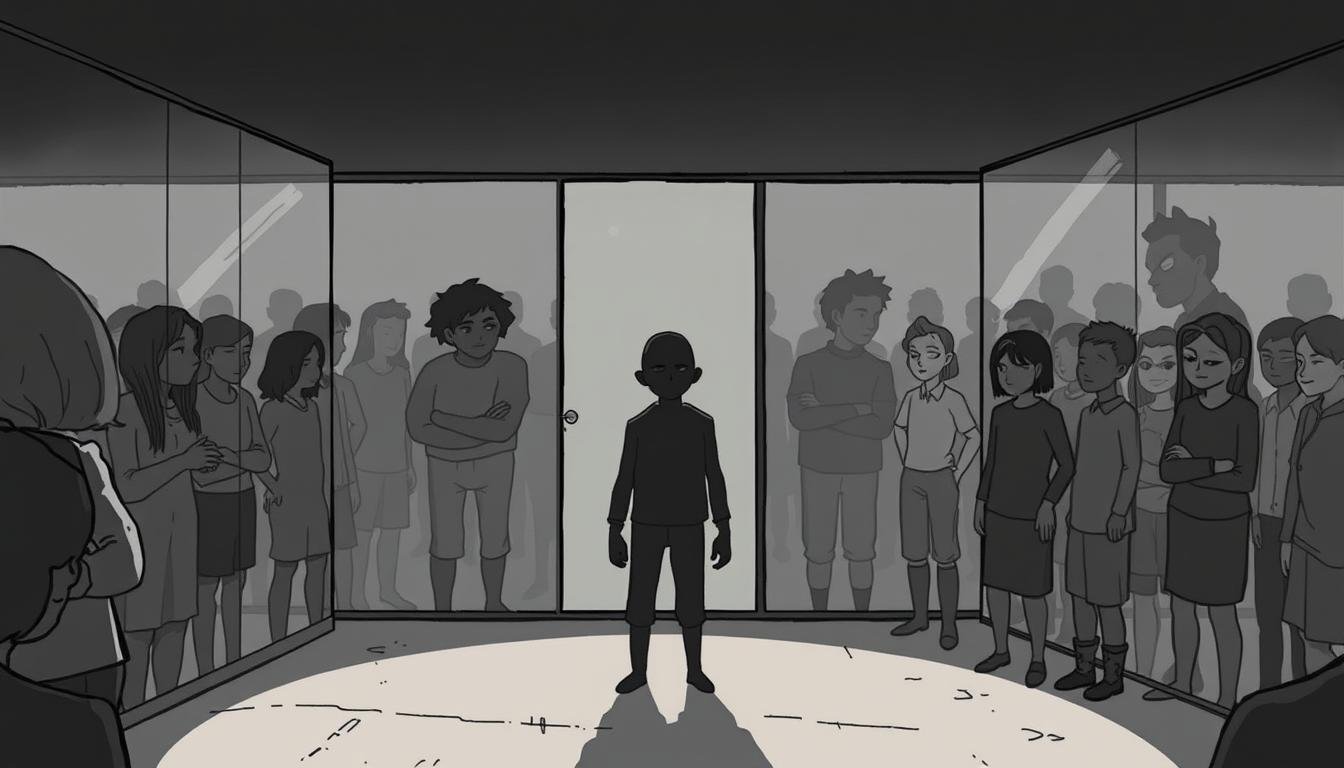Understanding Antisocial Personality Disorder
As a young police officer, Sarah often met people who didn’t care about others and did wrong without feeling bad. One case really caught her attention. A smooth-talking businessman had pulled off many scams, hurting many people, but he didn’t feel guilty. This case made Sarah want to learn more about antisocial personality disorder (ASPD) and how it affects society.
ASPD is a serious mental health issue that affects 1 to 4% of people. It’s marked by a long-term disregard for others’ rights, often shown through manipulation and crime. It usually starts in childhood or teen years, with symptoms getting worse between ages 24 to 44. But, strangely, these behaviors often lessen after 40.
Genetics are a big part of ASPD, with a heritability of 38 to 69%. But, things like childhood trauma or abuse also play a role. It’s important to understand ASPD to find better ways to help those with it.
Key Takeaways
- ASPD affects 1 to 4% of the population
- Symptoms typically peak between ages 24 to 44
- Genetic factors play a significant role in ASPD development
- Childhood trauma or abuse can contribute to ASPD onset
- ASPD often begins before age 15 with conduct disorder diagnosis
- Treatment options include psychotherapy and medication management
What is Antisocial Personality Disorder?
Antisocial Personality Disorder (ASPD) is a mental health issue. It shows a disregard for others’ rights and society’s rules. People with ASPD often act impulsively, lie, and are aggressive. They rarely feel sorry for what they do and often ignore rules.
Definition and Core Characteristics
ASPD starts in childhood or teen years and lasts into adulthood. The main signs include:
- Impulsivity in decision-making
- Deceitfulness in interactions with others
- Aggression towards people or animals
- Consistent disregard for rules and laws
Diagnostic Criteria in DSM-5-TR
The DSM-5-TR manual has specific rules for diagnosing ASPD. It looks for a history of conduct disorder before age 15. It also checks for at least three of seven adult behaviors, like breaking laws, showing no remorse, and being irresponsible.
Prevalence and Demographics
ASPD affects 1-4% of people. It’s more common in men. Those with a family history of mental health issues or a tough childhood are at higher risk.
| Demographic | Prevalence | Risk Factors |
|---|---|---|
| General Population | 1-4% | Family history, childhood trauma |
| Men | Higher prevalence | 3-5 times more likely to misuse substances |
| Women | Lower prevalence | Less likely to be diagnosed |
The History and Evolution of ASPD Diagnosis
The idea of Antisocial Personality Disorder (ASPD) started in the 19th century. Philippe Pinel and Jean Etienne Dominique Esquirol first noticed its signs. In the 1940s, Hervey Cleckley’s work on psychopathy was a big step forward.
Robert Hare’s research later helped define ASPD. This led to the term “antisocial personality disorder” being added to the DSM-III in 1980. This change was important because it made ASPD different from psychopathy and sociopathy.
Over time, the DSM criteria for ASPD have changed. These changes show how much we’ve learned about the disorder. Today, the focus is on behaviors that harm others, a key part that hasn’t changed.
| Year | Milestone | Impact on ASPD Diagnosis |
|---|---|---|
| 1980 | Introduction of ASPD in DSM-III | Established formal diagnostic criteria |
| 1994 | DSM-IV revision | Refined criteria, emphasized behavioral patterns |
| 2013 | DSM-5 publication | Further clarified diagnostic features |
These changes in diagnosing ASPD have helped us better understand and treat it. They’ve also led to more research into the disorder.
Recognizing the Signs and Symptoms of ASPD
Antisocial Personality Disorder (ASPD) shows through certain behaviors and feelings. It’s important to spot these signs early. ASPD affects about 3% of adults in the U.S., more men than women.
Behavioral Indicators
Those with ASPD often ignore rules and norms. They might break laws and act recklessly. They also tend to be irresponsible, leading to job and money issues.
Research shows they’re more likely to have substance problems and run into legal trouble.
Emotional and Interpersonal Traits
People with ASPD don’t feel empathy or guilt. They can be irritable or aggressive. They also lie and use fake names to manipulate others.
They have shallow relationships because they can’t keep connections long.
Cognitive Patterns
Those with ASPD think they’re better than others. They don’t learn from mistakes. They blame others and can’t accept their own actions.
They make choices without thinking about the future. ASPD can’t be diagnosed until 18, but symptoms start in youth. Therapy can help manage symptoms and improve life quality.
Antisocial Personality Disorder: Causes and Risk Factors
Antisocial Personality Disorder (ASPD) comes from a mix of factors. Genetics play a big part, with studies showing it’s more common in identical twins. Childhood trauma and economic conditions also play a role.
Childhood experiences can shape the risk of ASPD. Abuse, neglect, or unstable homes can make a child more vulnerable. Kids who grow up seeing violence or crime may develop antisocial traits.
Early life trauma, like war, can also be a risk factor. Family history is important too. If a parent has a substance use disorder, the child is more likely to develop ASPD.
ASPD affects 2% to 4% of people, with men more likely to have it. It’s common among inmates, with up to 47% of male prisoners and 21% of female prisoners having it.
| Risk Factor | Impact |
|---|---|
| Childhood Trauma | Increased risk of ASPD |
| Parental Substance Abuse | Higher likelihood of developing ASPD |
| Exposure to Violence | Can lead to antisocial behaviors |
| Genetic Factors | Contribute to ASPD susceptibility |
ASPD symptoms often show up in late teens and early twenties. While there’s no FDA-approved treatment, knowing the causes helps in finding ways to help and support those affected.
The Impact of ASPD on Individuals and Society
Antisocial Personality Disorder (ASPD) affects 0.6% to 3.6% of adults. Men are three times more likely to be diagnosed. This condition has big effects on both individuals and society.
Personal Relationships and Family Dynamics
People with ASPD find it hard to build strong relationships. Their lack of empathy and manipulative ways hurt family bonds. Kids of parents with ASPD often grow up in unstable homes, raising their risk of similar traits.
Occupational and Legal Consequences
ASPD often causes job problems and leads to criminal behavior. Studies show a link to substance abuse, making job challenges worse. Legal troubles are common, as many break laws without feeling guilty.
Societal Costs and Public Safety Concerns
The societal impact of ASPD is big. It strains the criminal justice system, healthcare, and social services. Public safety is a big worry because of the risk of violent behavior linked to ASPD.
| Impact Area | Consequences |
|---|---|
| Personal | Strained relationships, substance abuse |
| Occupational | Job instability, legal issues |
| Societal | Increased crime rates, public safety risks |
It’s key to understand these impacts to create good support for those with ASPD and their families.
Differential Diagnosis: ASPD vs. Other Personality Disorders
It’s key to tell Antisocial Personality Disorder (ASPD) apart from other personality disorders for the right treatment. ASPD has similarities with borderline and narcissistic personality disorders, but there are clear differences.
ASPD impacts 1% to 4% of Americans, with 80% showing symptoms by age 11. It’s more common in men and peaks between 24 and 44. Borderline personality disorder, on the other hand, affects both men and women equally and can be diagnosed at any age.
Those with ASPD show little emotion, ignore safety rules, and don’t feel sorry for their actions. They often use people for their own benefit. People with borderline personality disorder, however, feel intense emotions, fear being left, and have low self-esteem and identity issues.
| Characteristic | ASPD | Borderline Personality Disorder | Narcissistic Personality Disorder |
|---|---|---|---|
| Emotional Pattern | Few emotions | Intense, volatile emotions | Lack of empathy |
| Interpersonal Behavior | Manipulative, exploitative | Fear of abandonment | Grandiosity, need for admiration |
| Self-perception | Inflated self-worth | Poor self-esteem | Exaggerated self-importance |
| Treatment Approach | Long-term CBT | DBT, MBT | Psychodynamic therapy |
Conduct disorder in kids can turn into ASPD in adults. Early treatment of conduct disorder might lower this risk. It’s vital to remember that while these disorders share some traits, they need different treatments.
Treatment Approaches for Antisocial Personality Disorder
Treating Antisocial Personality Disorder (ASPD) is tough. There’s no single way to fix it, but some methods work. Let’s look at the options for those seeking help.
Psychotherapy Options
Talk therapy is a big part of ASPD treatment. Cognitive-behavioral therapy is especially helpful. It tries to change bad thought patterns and actions.
Mentalization-based therapy also helps. It teaches people to understand their own and others’ thoughts better.
Pharmacological Interventions
Even though there’s no FDA-approved drug for ASPD, some meds can help. Doctors might give out drugs for anxiety, depression, or anger. These can make symptoms better and help therapy work better.
Integrated Treatment Strategies
Using a mix of treatments often works best. This could be therapy, meds, and support groups. Therapeutic communities, especially in prisons, have shown to be effective. They offer a place where people can learn new ways to act and think.
Family support is very important. Family members can learn how to set boundaries and protect themselves. Getting help from skilled mental health professionals is crucial for both those with ASPD and their families.
| Treatment Approach | Focus | Potential Benefits |
|---|---|---|
| Cognitive-behavioral therapy | Changing thought patterns and behaviors | Improved decision-making, reduced aggression |
| Mentalization-based therapy | Understanding mental states | Better interpersonal relationships |
| Therapeutic communities | Structured environment for skill-building | Reduced antisocial behaviors, improved social skills |
Early diagnosis and treatment can lead to better results. If you or a loved one shows signs of ASPD, seek help from a mental health expert. They can guide and support you.
Living with ASPD: Coping Strategies and Support Systems
Living with Antisocial Personality Disorder (ASPD) can be tough. But, there are ways to handle it better. Self-management is key. This includes knowing yourself, controlling impulses, and setting achievable goals.
Learning social skills is also important. It helps in dealing with others better. This can make life easier.
Family support is crucial for those with ASPD. Studies show that about 3% of men and 1% of women have it. This shows how vital family backing is.
Having a strong support network is essential. This includes mental health experts. They can help manage symptoms and reduce bad behaviors.
Even though ASPD is lifelong, some people see their symptoms lessen with time. Treatment and support are key. Programs for education and work can give a sense of purpose.
It’s important to remember that ASPD often comes with depression, anxiety, and substance use. This means getting all-around care is vital.
Source Links
- Antisocial Personality Disorder: Beyond Keeping to Yourself
- Antisocial Personality Disorder: Causes, Symptoms, and More
- Antisocial personality disorder
- Antisocial personality disorder – Symptoms and causes
- Antisocial personality disorder
- Antisocial Personality Disorder – StatPearls
- The Natural History of Antisocial Personality Disorder
- Searching for Answers: The Evolving Psychiatric View of Antisocial Personality Disorder
- Potential Symptoms of Antisocial Personality Disorder
- Antisocial Personality Disorder: Signs, Symptoms, and Treatment
- What Are Symptoms of Antisocial Personality Disorder?
- Antisocial Personality Disorder Symptoms, Causes & Treatment
- Antisocial Personality Disorder
- Antisocial Personality Disorder: Often Overlooked and Untreated
- Antisocial Personality Disorder: Dealing with a Sociopath
- Understanding Antisocial Personality Disorder and Psychopathy | Psyclarity Health
- Antisocial personality disorder
- Antisocial Personality Disorder vs. Borderline Personality Disorder
- Antisocial personality disorder – Diagnosis and treatment
- Psychological interventions for antisocial personality disorder
- Living with Antisocial Personality Disorder | Charlie Health
- Antisocial personality disorder: prevention and management








